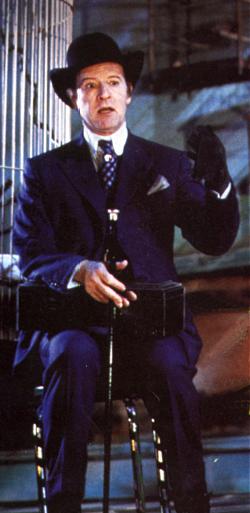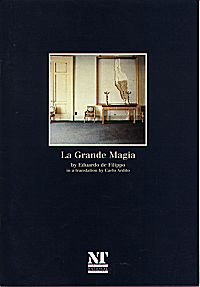La Grande Magia
Magical mix of emotions
|
EDUARDO DE FILIPPO'S entrancing and constantly
surprising La Grande Magia (1948) has its roots in the kind of story you
might hear in a bar.
A jealous husband and his beautiful young wife
are on holiday in the Italian Riviera. A magician arrives at their luxury hotel
and the wife steps into an Egyptian sarcophagus for the famous "lady vanishes"
routine. Only she really does vanish - into a nearby speedboat and the arms of
her lover.
Out of this conceit de Filippo spins a weird
and wonderful play about theatrical illusion and obsessional delusion. He was
clearly influenced by his great fellow countryman, Pirandello, and the piece
isn't quite in the league as Six Characters in Search of an Author. But
La Grande Magia does offer a compelling mixture of playful comedy, robust
humanity and painful emotion, while the final twist raises the hairs on the
back of the neck.
Richard Eyre is clearly having fun with this
production which he directs with assured panache. We're never allowed to forget
that we are sitting in a theatre. The Lyttelton has old-fashioned footlights at
the front of the stage, and Anthony Ward's evocative sets are assembled and
made to vanish before our very eyes. There are tantalising moments too when the
characters on stage seem to acknowledge the audience in front of them, and the
viewers are forced to recognise that they too are part of the theatrical
illusion, voluntarily suspending their disbelief.
And disbelief sometimes takes quite a bit of
suspending. When Calogero's wife disappears, the magician, endearingly played
by Bernard Cribbins, hands him a mirrored box. If Calogero has faith in his
wife's fidelity, says the old rogue, he should open the box and he will find
her. If he has the slightest doubt, however, he will find the box is empty and
will never see her again. |
 |
We are clearly in the world of myth here, rather than
reality, and myths, especially when set in the 20th century, can often seem
tediously fey. But Alan Howard plays Calogero with such anguished conviction
that the absurd seems plausible. In the early scenes Howard comes over as a
coldly fastidious, emotionally repressed dandy. Gradually, however, his whole
life is taken over by illusion as he clings to the belief that time and reality
are in fact a conjuror's trick, and at any moment the "experiment" will end and
his wife will be miraculously restored to him.
In the last act, four years have passed and Calogero
is now clearly certifiable. But then Howard movingly acknowledges his emotional
deficiencies, his wife miraculously returns, and you prepare yourself for a
touching scene of reunion and reconciliation. This is, after all, supposed to
be a comedy. And it is then that de Filippo springs the last of the night's
many surprises.
There is a marvellous richness to the play. In the
second act, for instance, a teenage girl dies in a deeply affecting scene
almost certainly inspired by the death of de Filippo's own young daughter. Yet
the same act also contains an hilarious routine involving a preposterous police
inspector to rival Clouseau (a scene-stealing tour-de-force from David Ross)
and passages when the writing takes on a rapt, poetic intensity as the magician
steers Calogero into his world of illusion.
There are moments when the production seems to drift,
and with the exception of Alison Fiske, supplying yet another cherishable cameo
as the conjuror's wife, most of the large supporting cast are thinly
characterised. Yet the play weaves a potent theatrical spell, and Eyre's
production is blessed with touches of real magic.
Charles Spencer.
The Daily Telegraph. 17.7.95.

